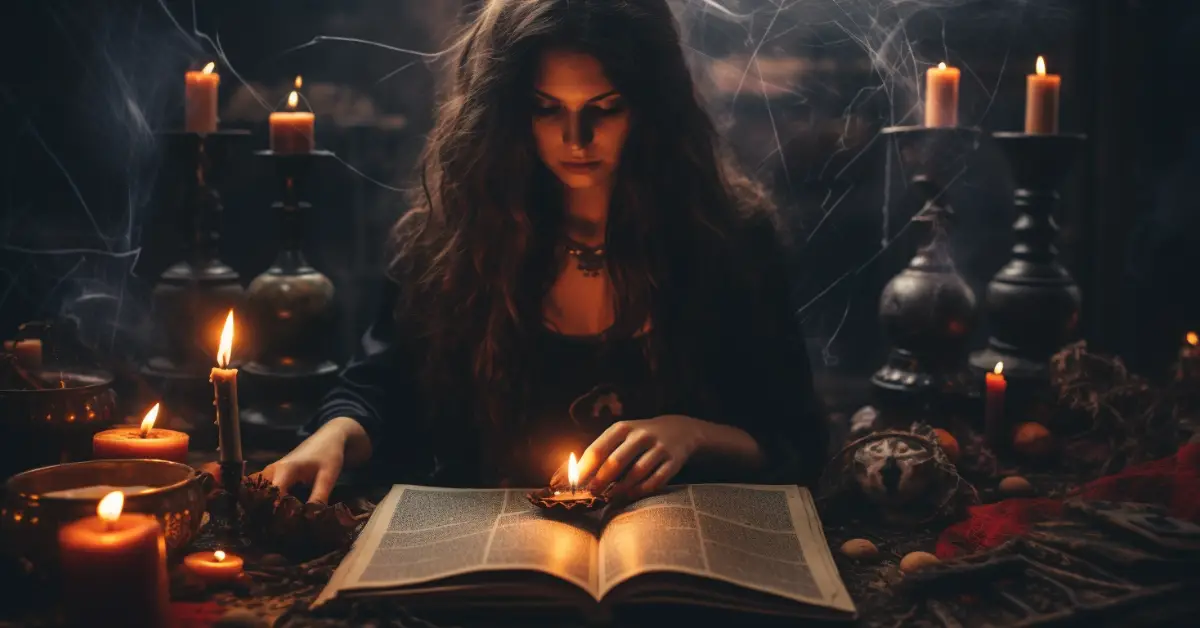Witchcraft, a term swirling with mystery and misconception. For those not looking to plunge into the depths of this article, here’s the gist: The Bible, predominantly in the Old Testament, addresses witchcraft as a serious sin, sternly warning against engaging in practices associated with the dark arts, such as divination and sorcery. The New Testament also touches on this, aligning such practices with works of the flesh and deeming them contrary to the Spirit of God.
Ready for a journey into the Biblical stance on witchcraft? There’s much more to uncover, so stay tuned. Dive into the ancient texts with us and uncover the essence of God’s view on the enigmatic concept of witchcraft.
What Does the Bible Say About Witchcraft?
The Bible’s perspective on witchcraft is layered, offering insights into how practices considered as witchcraft were perceived in ancient times. Witchcraft, in Biblical terms, refers to practices involving the invocation of spiritual entities and the use of sorcery and divination, which are condemned as they detract from the worship and reliance on God.
In the Old Testament, the Israelites are repeatedly warned against engaging in such practices. They are deemed as detestable, with God’s law explicitly prohibiting any form of witchcraft. This stems from the belief that such practices divert individuals from the true faith and reliance on God, leading them down a path of deception and sin.
Several instances illustrate the severity of engaging in witchcraft. One notable example is found in the book of 1 Samuel, where King Saul consults a medium, seeking counsel from the deceased prophet Samuel. This act is in direct violation of God’s commandments, illustrating the profound spiritual repercussions of involving oneself with the forbidden.
The New Testament reinforces this stance, categorizing witchcraft as a work of the flesh in Galatians. It is contrasted with the fruit of the Spirit, highlighting the incompatibility of such practices with the life Jesus calls us to lead. Any form of divination or sorcery is seen as rebellion against God, obstructing the true path to spiritual enlightenment and communion with the Divine.
This inherent conflict between the light of God and the shadows of witchcraft transcends mere adherence to law; it delves into the struggle of moral and spiritual integrity within one’s soul, showcasing the eternal battle between divine guidance and human temptation.
Bible Verses About Witchcraft
Delving deeper into the scriptures, Deuteronomy 18:10-12 conveys a stern warning against witchcraft, declaring those who practice it as detestable to the Lord. This verse draws a clear line, indicating that indulgence in such practices is a direct affront to God.
Exodus 22:18 is another poignant verse, succinctly stating, “You shall not permit a sorceress to live,” reflecting the gravity of the consequences associated with witchcraft in ancient Israelite society.
In Galatians 5:19-21, the Apostle Paul lists the acts of the flesh, including witchcraft, contrasting them sharply with the fruit of the Spirit. This serves as a reminder that engaging in such practices is not allowed for those who wish to inherit the kingdom of God, underscoring the moral and spiritual ramifications of deviating from the path of righteousness.
Leviticus 19:26 warns against partaking in divination or seeking omens, illustrating the broader spectrum of practices considered as witchcraft in biblical times. This verse emphasizes the essence of placing one’s faith and trust solely in God, steering clear of any form of spiritual deception.
1 Samuel 15:23 articulates that rebellion is as the sin of witchcraft, elucidating the depth of the sinfulness associated with such practices. It exemplifies the correlation between disobedience to God and aligning with dark forces, stressing the importance of adhering to divine instructions.
In the book of Micah 5:12, God promises to cut off witchcrafts and there will be no more soothsayers. This prophecy implies God’s ultimate authority and the eventual abolition of such practices, reinforcing His dominion over all spiritual realms.
In Acts 19:19, we witness new believers in Ephesus burning their scrolls related to magical arts as a sign of repentance and commitment to the new way in Jesus. This act signifies the transformative power of the Gospel, leading people away from the shadows into God’s marvelous light.
Revelation 21:8 lists practitioners of magic arts among those who will face the second death in the lake of fire. This ominous warning serves to remind us of the eternal repercussions of aligning with forces contrary to God.
2 Kings 21:6 depicts King Manasseh practicing soothsaying and witchcraft, doing much evil in the sight of the Lord, provoking Him to anger. This historical recount illustrates how such practices are an affront to God, straining the relationship between the Divine and humanity.
Lastly, in 2 Chronicles 33:6, the same King Manasseh is condemned for causing Judah and the inhabitants of Jerusalem to do worse than the heathen, due to his practice of witchcraft and dealing with familiar spirits and wizards. This emphasizes the widespread and detrimental impact of such practices on society and spiritual well-being.
Each of these verses harmoniously conveys the Biblical perspective on witchcraft. They counsel us to align with the moral and spiritual compass provided by the teachings of Jesus, fostering a life steeped in the light of God’s truth and love, and avoiding the deceptive and perilous path of the dark arts. The scripture invites us to surrender our beings to the sovereign will of God, trusting wholly in His wisdom and forsaking the illusions of control offered by witchcraft. In doing so, we navigate our way through existence, firmly anchored in the eternal and unwavering love of our Creator.


